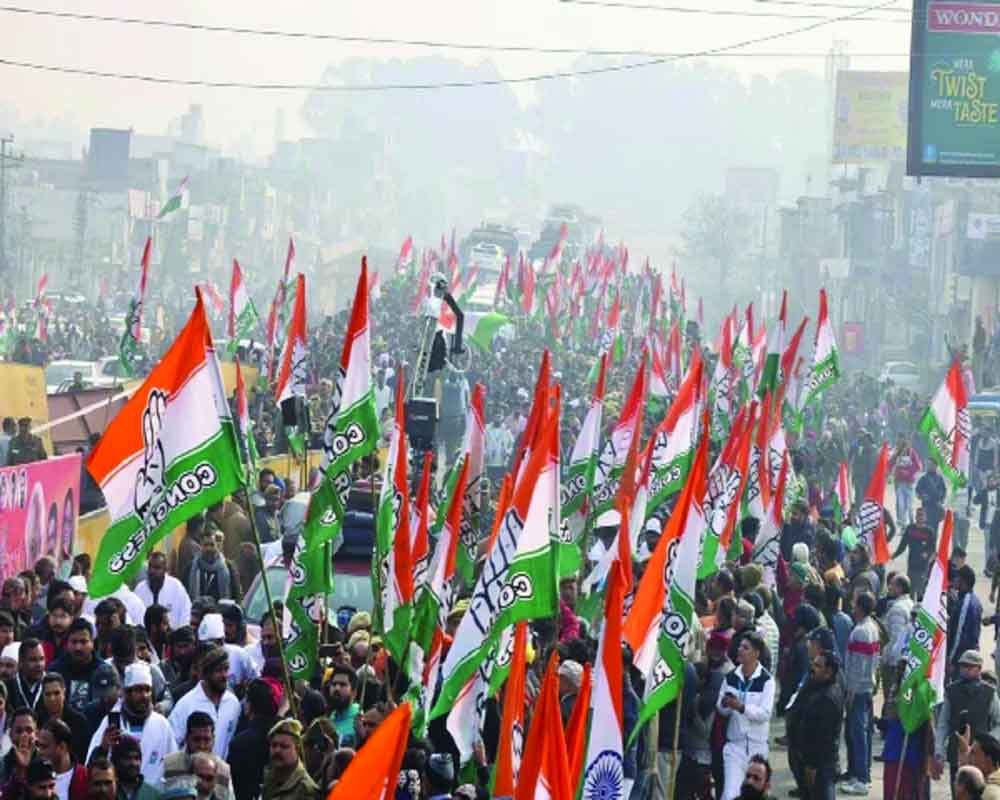As Karnataka braces for the Lok Sabha elections, the political arena is set for a fierce clash between the Congress and the BJP-JD(S) alliance
The Lok Sabha elections are coming up in Karnataka and will be held in 28 constituencies on April 26 and May 7. The Congress party and the BJP-JD(S) alliance will compete to win voters’ support. Prime Minister Narendra Modi has visited the State multiple times to campaign for BJP candidates. BJP has the support of former chief minister Yediyurappa, who is widespread among the Lingayat community and is a significant vote bank in the State. These elections are crucial for Karnataka’s future and mark a pivotal moment in its history.
Karnataka has been a stronghold of Congress for many years. It supported Prime Minister Indira Gandhi even after the Emergency, is a testament to its political significance. This historical significance is evident from the victories of Indira Gandhi and Sonia Gandhi, who both won seats in Karnataka for the Congress party.
These elections are not just a contest but a high-stakes battle between Congress, BJP and the Bharatiya Janata Party-Janata Dal (Secular) alliance. They symbolise the BJP’s re-entry into Karnataka’s political landscape. The election could shift policy priorities and governance style, potentially impacting various sectors of the State’s economy and society. The results will have significant consequences for people’s lives, making their participation and understanding of the process crucial.
The Bharatiya Janata Party (BJP) seeks to emerge victorious in the upcoming Karnataka elections to solidify its regional dominance in the South, enhance its standing in national politics and extend its sphere of influence in southern India. In contrast, the Indian National Congress is committed to protecting its Government in the State. At the same time, the Janata Dal (Secular) [JD(S)] endeavours to survive in a highly competitive political climate. In essence, JD(S) is striving to attain political longevity.
The BJP’s campaign in Karnataka centres around PM Modi’s achievements and Congress’s failures. It targets two influential communities, the Lingayats and Vokkaligas, who are crucial to its electoral strategy. The Lingayats, being a dominant community in the State, have traditionally supported the BJP.
In contrast, the Vokkaligas, another influential community, has been a JD (S) stronghold. Winning over these communities is crucial for the BJP’s electoral success.
The BJP faces some local conflicts. For the first time since 2014, the party has had an open rebellion. The reason for this is the BJP-JDS alliance, which has yet to be well received. The Congress, too, has its rebel candidates. Congress is targeting SCs, STs and Muslims in Karnataka.
The Congress Government implemented five essential poll guarantees promised last year, which included free bus rides for women, increased funding for education and job creation. These promises were designed to address specific concerns of the region’s voters and reflect the party’s commitment to social welfare and economic development.
Three pre-poll surveys by Edina, News 18 and India Today Group predict conflicting results for Karnataka’s upcoming elections. Edina predicts Congress will win 17 seats and the BJP-JDS alliance will bag 11. News 18 forecasts NDA will win 25 seats, Congress only 3. India Today Group predicts NDA will win 24 seats with a 53 per cent vote share. The INDIA alliance, a regional party alliance, is expected to secure only four seats with a 42 per cent vote share. These surveys provide a snapshot of the current political landscape.
They can help readers gauge the potential outcomes of the election. There is a significant shift from the 2019 polls when Congress and JD(S) were allies. The BJP aims to secure the Vokkaliga vote in Old Mysore and tilt the election in their favour. The Vokkaligas, a dominant community in the Old Mysore region, have traditionally supported the JD (S). The BJP’s strategy to win over this community involves a combination of caste-based outreach, promises of development and highlighting the failures of the JD (S) Government. If successful, this strategy could significantly impact the election outcome and the State’s political landscape.
The BJP has fielded a top cardiologist, a member of the Mysuru royal family and an ex-chief Minister among its candidates. It has also fielded some new faces. The Congress has many ministers’ relatives and these candidates can impact the result.
Since the BJP formed its first Government in 2008, the ‘toppling game has been ongoing. Money and positions often play a significant role in luring legislators to shift loyalties, adding another layer of complexity to the State’s political landscape. Both parties are willing to spend money.
The upcoming election in the State poses a decision for voters. They must choose between supporting the Congress party they previously elected in the Assembly polls or the BJP, which had held power earlier. While some may prefer the Congress, the BJP still has a loyal following. Suppose the voters choose to reject the BJP. In that case, it’ll signify that the political party’s access to the South has been closed, at least temporarily and the return of Congress is on the right track.
(The writer is a popular columnist; views are personal)


























